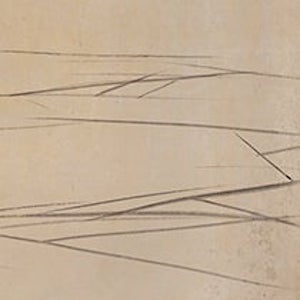 Boo Hewardine – Before
Boo Hewardine – Before
Reveal Records – 6 September 2019
One dictionary definition of the word ‘confound’ is “cause surprise or confusion in (someone), especially by not according with their expectations”, and Before, the latest solo release from Boo Hewardine certainly has the capacity to confound, albeit in the most positive of ways.
With previous release, 2017’s Swimming in Mercury, being, in his own words, “the most complex work I had done since The Bible days”, the latest album displays a return to the power of simplicity, which is not to say that the music is simple, merely a reflection of a conscious decision to release songs in their “first draft” rather than finely crafted or honed, hence the album’s title Before. His propensity for being drawn to distilling things into as minimal a form as possible extends beyond the music to the artwork too, with the cover being a reproduction of a late 18th century painting Cracked Ice by Maruyama Ōkyo, founder of the Maruyama schools of painting in Kyoto, Osaka and other locations, whose personal style of Western naturalism was mixed with Eastern decorative design, and an even more minimalistic, spartan inside sleeve, possibly the aim being to encourage the listener/reader to explore further, unaided.
The seed leading to the evolution of the album was sown last year when Boo’s producer and studio partner Chris Pepper found a dulcitone, a keyboard instrument, originally designed in Glasgow in the 1860’s by Thomas Machell and manufactured by his firm during the late nineteenth and early twentieth centuries, which produces sound when tuning forks vibrate when struck by felt-covered hammers (a pre-cursor to the Fender Rhodes). Inspired by the delicate sounds produced, other esoteric instruments were acquired, including Indian harmonium and vibraphone. Using these, plus his father’s old piano, and no guitars, Hewardine commenced recording, originally with no intention of releasing the fruits of his labour as an album. Enter onto the scene Stockholm-born multi-instrumentalist Gustaf Ljunggren, collector of strange instruments and a musical collaborator on Boo’s 2002’s album Anon, who was invited to respond to, and augment, these recordings. A challenge which has resulted in an album of breathtaking beauty.
A further interesting feature of the CD is that there are little cameo transitional pieces between each of the substantive tracks, with, perversely, one exception, all of which were composed by Gustaf, who was given free range here. I’m not sure whether this is a trend, but the same device was also used on the latest release from Terry Hiscock¸ Falling More Slowly. The effect, in both cases, is to facilitate the ability to listen to the album as a whole entity, almost as if they were written as a single composition. It’s certainly a strategy that has merits. Intriguingly, both releases also have all tracks listed in lower- case lettering.
Whilst Tom Robinson may have quipped “no guitars were harmed in the making of this record”, and indeed that is the case in respect of Boo, pedal steel and the exotically described “prepared guitar” do feature, alongside a plethora of other vintage instruments, Gustaf alone is credited with 15, Boo, a mere 9, all of which create an aural environment which transports the listener into a realm of blissful delight.
From the moment the first, delicate, notes of the opening track, last rays of sun, introduce Boo’s gentle vocals, the tone and timbre of the release are set. Rarely does the music being played so perfectly complement the lyrics (or vice versa)
We see true beauty
In the last rays of Sun
With lyrics inducing feelings of nostalgia, be it in imaginary friends
When I was young I used to ride
My bike along the old canal
And their imaginary friends
Would laugh with me where are they now?
or, what I interpret to be a reference to J.M Barrie‘s fictional island neverland
The dawn’s here again
And the birds sing so sweetly
But they always do
In Neverland
the atmosphere created by the accompanying music is mesmerising.
Listeners should also be able to empathise with themes of life’s vulnerabilities and beauties, exposed in all of their rawness, for example in silhouette
When you just can’t remember
How you should be
When all that you have
Is a faint memory
When shadows are your only
Company
Then you’re a silhouette
The version of starlight, co-written with Eddi Reader, presented here is a very different interpretation to that which is on the latter’s Cavalier release; gone are the orchestral arrangements, instead, a much more stripped back approach results in a much more lugubrious outcome, one to be savoured.
In many ways, the song which closes the album i wish i had wings epitomises the stated ethos of album. Made up in his head before arriving at the studio, and then immediately recorded, the whimsy, and pure joie-de-vivre shines through
I know these words aren’t much
But I don’t care
I can hear an orchestra
It’s in the air
Notwithstanding the almost naive way in which Boo aimed to produce the record, Before nevertheless presents as a true labour of love; rarely have instinctive ‘demos’, (word used advisedly), been so polished.
To describe the album as sounding effortless is intended as the highest compliment. Unorthodox it may be, however, with Before, Boo has triumphed in having simultaneously managed not only to evoke the past but to do so with great originality.
Order Before via Reveal Records
For dates and more details visit: https://boohewerdine.net/

